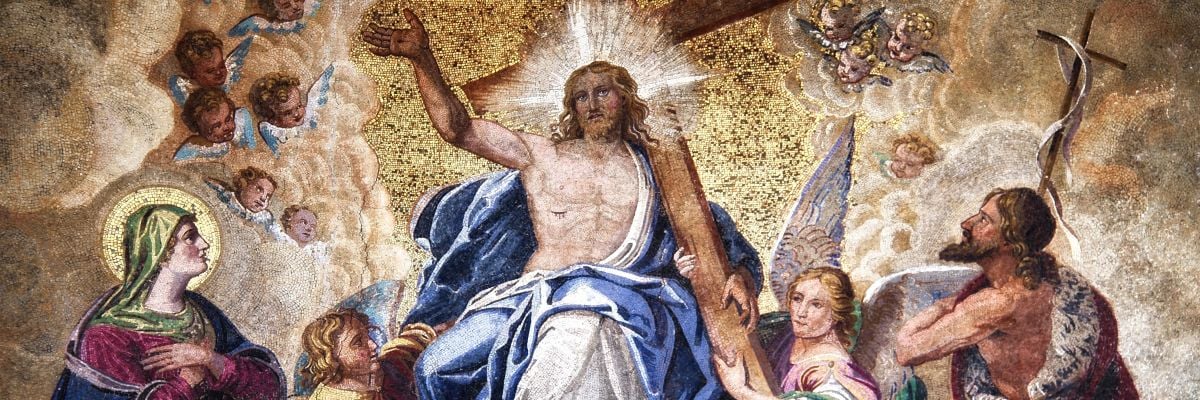
Homily for the Ascension of the Lord, Year C
Brothers and sisters:
May the God of our Lord Jesus Christ, the Father of glory,
give you a Spirit of wisdom and revelation
resulting in knowledge of him.
May the eyes of your hearts be enlightened,
that you may know what is the hope that belongs to his call,
what are the riches of glory
in his inheritance among the holy ones,
and what is the surpassing greatness of his power
for us who believe,
in accord with the exercise of his great might:
which he worked in Christ,
raising him from the dead
and seating him at his right hand in the heavens,
far above every principality, authority, power, and dominion,
and every name that is named
not only in this age but also in the one to come.
And he put all things beneath his feet
and gave him as head over all things to the church,
which is his body,
the fullness of the one who fills all things in every way.-Eph. 1:17-23
The practice of making a nine-day intention of prayer to the saints, called a novena after the Latin word for “nine,” is very often associated with the nine days of waiting between the Lord’s Ascension into heaven and his sending of the promised Holy Spirit on Pentecost. This time, which the apostles and disciples spent in prayer with Mary in the Upper Room or Cenacle, becomes thus the model of all other novenas.
The gift of the Holy Spirit is the greatest of God’s gifts to us, since it is by this gift that we receive all the graces of salvation and sanctification for which we hope: gifts, virtues, fruits, sacraments, states of life and special charisms, and final perseverance, all the way to our own resurrection on the Last Day. And still more we receive from the promised Holy Spirit not only these good things, but also the power and protection to struggle against our spiritual enemies, armed, as the apostle says, with the “sword of the Spirit.” This is truly a novena that was “never known to fail,” as some novena prayers in circulation say!
We can see that the effect of this first novena was exceedingly powerful, a greater extensive outpouring of the Holy Spirit than ever before: the grace of Pentecost that will come soon. We might ask what component of this novena made it more powerful than the many longing prayers made by the faithful before. The answer to this question explains the very Catholic instincts behind our novenas.
Notice that the apostle tells us today of the “riches of glory in his inheritance among the holy ones” on Holy Saturday, the day Our Lord descended among the dead to bring the departed spirits of the just the beatific vision of the Holy Trinity. Then he remains ministering on earth for forty days, appearing to his disciples. It is not until Ascension Thursday that he leads all these blessed souls into the final realm of heaven. From that day heaven was for the first time the place of the full communion of saints as they took their places and their role of interceding for their fellow human beings.
The Byzantine rite, in fact, associates the feast of All Saints with Pentecost Sunday. Yes, we are in this Ascensiontide in a novena of All Saints. God the Father wanted to give the blessed in heaven a share in sending, through the humanity of the risen and ascended Lord, the overflowing gifts of the Holy Spirit. This new heaven-fueled fire was kindled also with the fervent and joyful prayers of the elect, now free from the restraints of earthly life and of death. Combine this with the fact that the prayers of Mary rose up from the earth from the mount of Zion at this same time, and we can easily see—and greatly marvel at—the power of this event. It is the great purpose of the mystery of the Ascension of the Lord we celebrate today: the entry of his holy ones into life and the Church’s unbreakable communion with them, which we call “the communion of saints.”
So let us not take lightly or for granted the venerable and powerful custom of making various novenas to the saints. Sometimes Catholics who regard themselves as more sophisticated or “liturgical” than others may look down on these practices. For them we pray that God may five them “a spirit of wisdom and revelation” as we hear today. What is more in line with the desires of the Spirit who, as the apostle says, “intercedes for us with unutterable groanings” than to go with faith to those to whom the same Holy Spirit has given a share in his mission of intercession for us?
May the days of our lives never be far from days on which we count out our novenas with confidence in the Holy Spirit’s power: he is the promise “never known to fail.”



